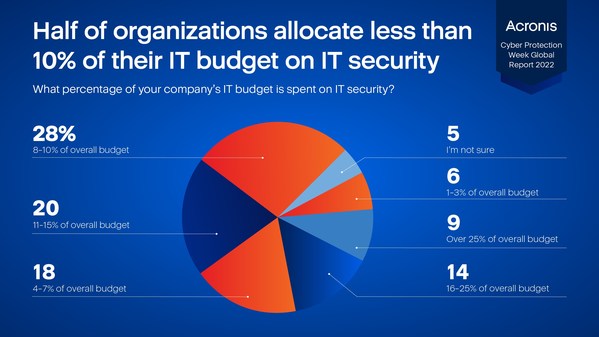76% of organizations suffered downtime and data loss in 2021, system crashes, human error and cyberattacks to blame
SINGAPORE and SYDNEY, April 1, 2022 /PRNewswire/ -- Acronis, the global leader in cyber protection, has released its annual Cyber Protection Week Global Report 2022 timed to this year's World Backup Day. The report which surveyed over 6,200 IT users and IT managers from small businesses to enterprises across 22 countries, exposes some of the most critical shortcomings appearing in cyber protection practices today, examines why they're appearing and offers guidance on how they can be fixed.

Acronis Cyber Protection Week Global Report 2022 reveals growing threats and need for integrated cyber protection solutions
One of our key findings last year was that 80% of organizations ran as many as 10 solutions simultaneously for data protection and cybersecurity — yet more than half of them suffered downtime because of data loss. Clearly, more solutions do not translate into more protection.
This year, we see that trend getting worse: while 78% of organizations globally run as many as 10 different solutions, 76% of organizations experienced downtime due to data loss — a 25% increase from 2021. This downtime stemmed from a number of sources, including system crashes (52%), human error (42%), cyberattacks (36%) and insider attacks (20%).
As a result, 61% of global organizations' IT teams now report a preference for integrated solutions that replace their complicated stacks of cybersecurity and data protection tools with a single, unified console.
"As the entire world is increasingly at risk from different types of attacks, accelerating to universal all-in-one solutions is the only way to achieve truly complete cyber protection. And that's precisely the problem Acronis has set out to solve," says Candid Wuest, Acronis V.P. of Cyber Protection Research. "Attackers don't discriminate when it comes to means or targets, so strong and reliable security is no longer an option, it's a necessity."
Overconfidence as a trend: IT teams are overselling their readiness
We've traced another worrying trend that is responsible for cyberdefenses lowering and increasing IT security budgets:
It seems that IT managers are trying to appear better prepared than they are; but that is, in turn, misleading their managers, boards of directors, industry analysts and customers.
However, if the overwhelming majority of IT managers indeed have these solutions, they aren't using them right: they have simply stocked their IT stacks with all of the recommended cybersecurity technologies — spending more money in vain.
Our findings prove that organizations are spending more on IT security this year, but when we compare it to their overall IT budget, it becomes clear – organizations are still treating cyber protection as a "nice-to-have" not as a "must-have":
Pandemic-driven spike in awareness proves temporary
Frequent backups that were fuelled by the shift to remote work are over: a third of IT managers only back up weekly, while another 25% back up monthly. Use of backup best practices is declining across the board — only 15% of organizations' IT teams adhere to them.
Same as last year, 10% of IT managers still aren't sure if their company is subject to any data privacy regulations — proving that IT managers, like IT users, get stuck in their ways.
According to our research, 86% of organizations globally are also concerned about the threat of increasing politically-driven cyberattacks caused by the worsening geopolitical climate — but their concern does not translate into improvements to their cyber protection.
Bottom line, the outdated approaches that professional IT teams have relied on for years are now actively failing them. A comprehensive, easy-to-follow approach is essential to achieving a more reliable, holistic protection for data, applications and systems – one that combines cybersecurity, data protection and management into one solution.
Users show concern over cyberthreats, but backup habits remain unchanged
Only one in ten users backs up daily, while 34% of users back up on a monthly basis — a staggering 41% of users back up rarely or never. Still, 72% of users had to recover from backup at least once in the past year (33% — more than once). Meaning that some of the users who chose not to back up have permanently lost their data:
What we see here is a massive gap in how organizations and individuals approach cyber protection in theory — and in practice. Acronis provides a number of solutions that are able to bridge that gap — among them Acronis Cyber Protect, used by over 20,000 service providers to protect more than 750,000 businesses.
For more global and regional insights, check out the Acronis Cyber Protection Week Global Report 2022 and the regional deep dives — download the reports for free on our website.
About Acronis
Acronis unifies data protection and cybersecurity to deliver integrated, automated cyber protection that solves the safety, accessibility, privacy, authenticity, and security (SAPAS) challenges of the modern digital world. With flexible deployment models that fit the demands of service providers and IT professionals, Acronis provides superior cyber protection for data, applications, and systems with innovative next-generation antivirus, backup, disaster recovery, and endpoint protection management solutions powered by AI. With advanced anti-malware powered by cutting-edge machine intelligence and blockchain based data authentication technologies, Acronis protects any environment – from cloud to hybrid to on premises – at a low and predictable cost.
Founded in Singapore in 2003 and incorporated in Switzerland in 2008, Acronis now has more than 2,000 employees and offices in 34 locations worldwide. Its solutions are trusted by more than 5.5 million home users and 500,000 companies, and top-tier professional sports teams. Acronis products are available through over 50,000 partners and service providers in over 150 countries and 26 languages.